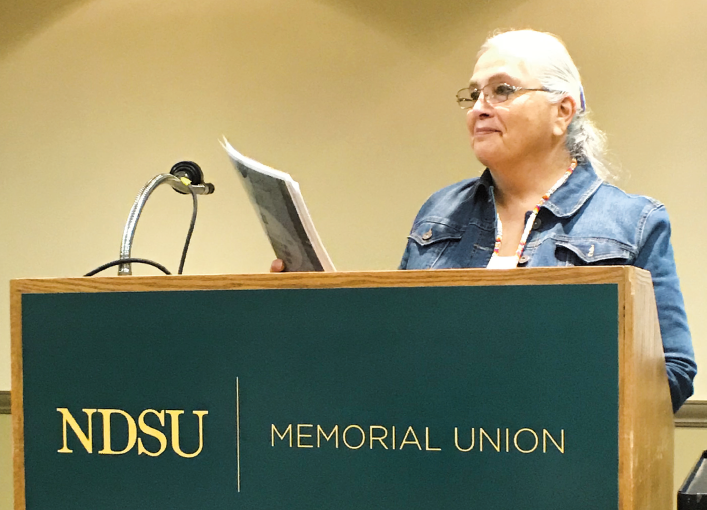The ‘Bitter Tears’ speech was given in the Memorial Union noon Wednesday. The name of the speech was created after Denise K. Lajimodiere saw sap rolling down a tree — a tree that had roots entangled into the bodies of the children in the unmarked graves at a Native American boarding school.
Lajimodiere’s presentation came with many quotes from people that endured the boarding school and those that worked with them. Many people recalled what was done to them years ago.
“They gave me the number 76. I was number 76. All my clothes, underwear, socks, dresses had the number 76,” said Ann Grandbois Plante of Marty Boarding School in South Dakota. Years later, some of these people tattooed those numbers on their arms.
Lajimodiere said the United States does not have many records on these boarding schools. She said we do not know how many boarding schools there are and we do not know how many boarding school survivors there are.
“Most of them lived in and around the reservation,” Lajimodiere said. “They were not allowed to go home for nine months, and parents were not allowed to come visit.”
Later in the presentation, Lajimodiere described different types of punishment the children would endure, such as the gauntlet, the dungeons under the floor and the broomstick — where they made them kneel on a broomstick with their nose touching the wall.
“Three girls ran away, but got caught. The matrons and schoolteachers lined up, even the superintendent of the school, and the girls had to walk between them. They all took a whack at them with a belt as they went through. We called it the gauntlet. They made all us girls watch,” according to an anonymous girl from Wahpeton, North Dakota.
These boarding schools had religious education despite them being federally funded.
“They forced Christianity. You didn’t have a choice. If you didn’t go to church, you didn’t eat,” Lajimodiere said. “Everyone I interviewed was sexually molested by priests and nuns, and if not by them, by older boys.”
One of the people that she interviewed said the little boys in his dorm would be taken by the dorm workers at night and they would come back crying.
Lajimodiere said that boarding school trauma is one of the best-kept secrets among Native American people because they do not want to talk about what happened to them there.
“Someone said that, ‘All you do is talk about the negative. You don’t talk about anything good at boarding schools.’ Well, honest to God, in 10 years I have not heard a whole lot of good at the boarding schools,” Lajimodiere said.
Lajimodiere said the boarding school survivors and their families are working toward healing. There is a lot of intergenerational trauma and a lot of historical trauma that they have to work through.
